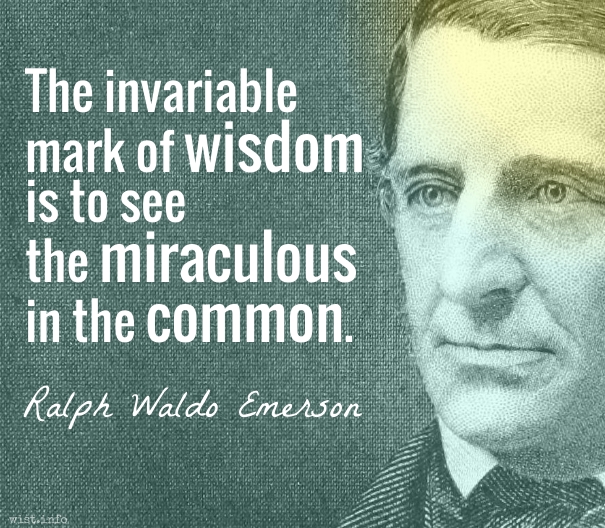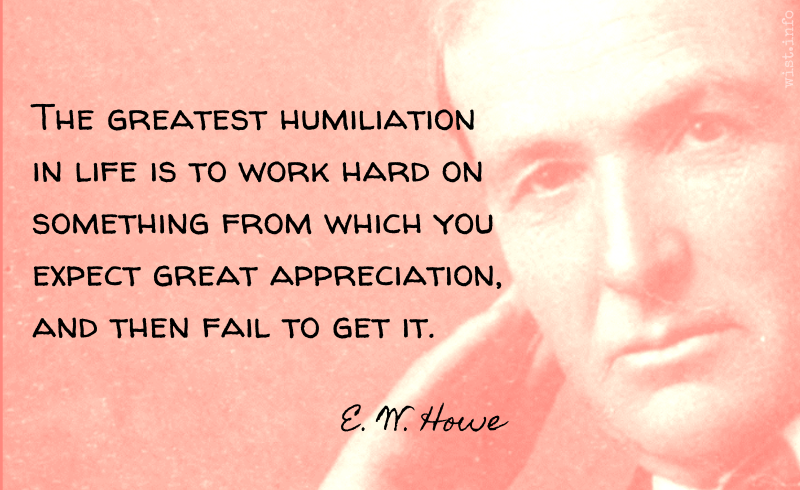FRIAR: For it so falls out
That what we have we prize not to the worth,
Whiles we enjoy it, but being lacked and lost,
Why then we rack the value, then we find
The virtue that possession would not show us
Whiles it was ours.William Shakespeare (1564-1616) English dramatist and poet
Much Ado About Nothing, Act 4, sc. 1, l. 228ff (4.1.228-233) (1598)
(Source)
Quotations about:
appreciation
Note not all quotations have been tagged, so Search may find additional quotes on this topic.
So new, so smooth, my dainty book,
A gift for whom? Cornelius, look,
‘Tis yours: for you in early days
Were ever wont my rhymes to praise.[Cui dono lepidum novum libellum
arido modo pumice expolitum?
Corneli, tibi; namque tu solebas
meas esse aliquid putare nugas.]Catullus (c. 84 BC – c. 54 BC) Latin poet [Gaius Valerius Catullus]
Carmina # 1 “To Cornelius Nepos,” ll. 1-4 [tr. MacNaghten (1925)]
(Source)
Dedication of the collection (though the canonical collection of Catullus's poems is dubious in its provenance).
(Source (Latin)). Alternate translations:
With pumice dry just polish'd fine,
To whom present this book of mine;
This little volume smart, and new? --
Cornelius, I will give it you:
For then you oft were wont to say
Some trifling merit had my lay.
[tr. Nott (1795)]
My little volume is complete,
With all the care and polish neat
That makes it fair to see:
To whom shall I then, to whose praise,
Inscribe my lively, graceful lays?
Cornelius, friend, to thee.
[tr. Lamb (1821)]
My little volume is complete,
And with the pumice made as neat
As tome need wish to be;
And now what patron shall I choose
For thee gay sallies of my muse?
Cornelius, whom but thee?
For though they are but trifles, thou
Some value didst to them allow.
[tr. T. Martin (1861), st. 1-2]
To what dear friend, say, shall I dedicate
My smart new book, just trimm'd with pumice dry?
To thee, Cornelius -- for, in years gone by,
Thou was accustom'd my light lays to rate
As something more than trifles.
[tr. Cranstoun (1867)]
My little book, that's neat and new,
Fresh polished with dry pumice stone,
To whom, Cornelius, but to you,
Shall this be sent, for you alone --
(Who used to praise my lines, my own) ....
[tr. Lang (1888)]
To thee (Cornelius!); for wast ever fain
To deem my trifles somewhat boon contain.
[tr. Burton (1893)]
To whom inscribe my charming new book -- just out and with ashen pumice polished? Cornelius, to you! for you used to deem my triflings of account.
[tr. Smithers (1894)]
To whom am I to present my pretty new book, freshly smoothed off with dry pumice stone? To you, Cornelius: for you used to think that my trifles were worth something, long ago.
[tr. Warre Cornish (1904)]
To whom shall I offer this book, young and sprightly,
Neat, polished, wide-margined, and finished politely?
To you, my Cornelius ....
[tr. Stewart (1915)]
To whom shall I offer my new little book
Looking as polished as parchment can look?
Cornelius, to thee, for 'twa thou who didst prize
My trifles as something e'en then in thine eyes.
[tr. Symons-Jeune (1923)]
To whom this dainty booklet polished new
With pumice stone? Cornelius, to you.
For you were wont my versicles to praise
As things of value in those bygone days.
[tr. Wright (1926), ch. 3]
Who shall receive my new-born book,
my poems, elegant and shy,
neatly dressed and polished?
You, Cornelius,
shall by my single patron,
for, long ago, you praised my slender lines and stanzas.
[tr. Gregory (1931)]
Whom do I give my neat little volume
slicked dry and made fashionable with pumice?
Cornelius, to you: remindful that you
used to dwell on my scantlings as something great.
[tr. Zukofsky (1959)]
To whom will I give this sophisticated,
abrasively accomplished new collection?
To you, Cornelius! You had the habit
of making much of my poetic little.
[tr. C. Martin (1979)]
To whom do I send this fresh little book
of wit, just polished off with dry pumice?
To you, Cornelius: since you were accustomed
to consider my trifles worth something
even then.
[tr. Kline (2001)]
To whom do I dedicate this charming slim volume,
just now polished with dry pumice stone?
For you Cornelius, for you were accustomed to think
that my scribblings were something.
[tr. Ozlem (2003)]
Who's the dedicatee of my new witty
booklet, all fresh-polished with abrasive?
You, Cornelius: for you always used to
feel my trivia possessed some substance.
[tr. Green (2005)]
To whom to give this charming little book
dryly polished with a pumice stone?
To you, Cornelius: you used to think
my trivial little scribbles worth a look.
[Source (2011)]
Who is it I should give my little book to,
So pretty in its pumice-polished covers?
Cornelius, I'll give my book to you:
Because you used to think my nothings somethings.
[tr. Ferry (2012)]
To whom do I give this pleasing new little book,
Just now smoothed with dry pumice?
To you, Cornelius: For you were accustomed
To consider my trifles to be something.
[tr. Wikibooks (2017)]
To whom do I give this elegant new booklet,
polished just now with dry pumice?
To you, Cornelius! Since you always
thought my doggerel was worth something.
[tr. Wikisource (2018)]
We are in this lifetime together. And maybe it’s possible to appreciate the other guy for the way his mind works, even when he’s not working your way.
Norman Lear (1922-2023) American television writer-producer
“What makes Norman Lear, at 98, still tick?”, interview by Jonathan LaPook, CBS News Sunday Morning (2021-01-10)
(Source)
The measure of achievement is not winning awards. It’s doing something that you appreciate, something you believe is worthwhile. I think of my strawberry souffle. I did that at least twenty-eight times before I finally conquered it.
I am not concerned that other people do not understand me. I worry that I do not understand other people.
[不患人之不己知、患不知人也]
Confucius (c. 551- c. 479 BC) Chinese philosopher, sage, politician [孔夫子 (Kǒng Fūzǐ, K'ung Fu-tzu, K'ung Fu Tse), 孔子 (Kǒngzǐ, Chungni), 孔丘 (Kǒng Qiū, K'ung Ch'iu)]
The Analects [論語, 论语, Lúnyǔ], Book 1, verse 16 (1.16) (6th C. BC – AD 3rd C.) [tr. Li (2020)]
(Source)
(Source (Chinese)). See also 4.14, 14.30, 15.19. Alternate translations:
I will not be afflicted at men's not knowing me; I will be afflicted that I do not know men.
[tr. Legge (1861)]
It does not greatly concern me that men do not know me; my great concern is, my not knowing them.
[tr. Jennings (1895)]
One should not be concerned not to be understood of men; one should be concerned not to understand men.
[tr. Ku Hung-Ming (1898)]
I will not grieve that men do not know me; I will grieve that I do not know men.
[tr. Soothill (1910)]
Not worried that men do not know me, but that I do not understand men.
[tr. Pound (1933)]
[The good man] does not grieve that other people do not recognize his merits. His only anxiety is lest he should fail to recognize theirs.
[tr. Waley (1938)]
I am not concerned that people do not know of me; I am concerned that I do not know of them.
[tr. Ware (1950)]
It is not the failure of others to appreciate your abilities that should trouble you, but rather your failure to appreciate theirs.
[tr. Lau (1979)]
One does not worry about the fact that other people do not appreciate one. One worries about not appreciating other people.
[tr. Dawson (1993)]
Don't worry if people don't recognize your merits; worry that you may not recognize theirs.
[tr. Leys (1997)]
Do not worry about men not knowing you; rather, worry about incapability and ignorance.
[tr. Huang (1997)]
Do not worry about that others do not understand me, just worry about that I do not understand others.
[tr. Cai/Yu (1998)]
Don't worry about not being acknowledged by others; worry about failing to acknowledge them.
[tr. Ames/Rosemont (1998)]
He does not worry that others do not know him; he worries that he does not know others.
[tr. Brooks/Brooks (1998)]
Don't grieve when people fail to recognize your ability. Grieve when you fail to recognize theirs.
[tr. Hinton (1998)]
Do not be concerned about whether or not others know you; be concerned about whether or not you know others.
[tr. Slingerland (2003)]
Don’t worry about whether other people understand you. Worry about whether you understand other people.
[tr. Watson (2007)]
Do not worry that other people do not know you. But be concerned that you do not know them.
[tr. Annping Chin (2014)]
The world is indeed full of peril, and in it there are many dark places; but still there is much that is fair, and though in all lands love is now mingled with grief, it grows perhaps the greater.
J.R.R. Tolkien (1892-1973) English writer, fabulist, philologist, academic [John Ronald Reuel Tolkien]
The Lord of the Rings, Vol. 1: The Fellowship of the Ring, Book 2, ch. 6 “Lothlórien” [Haldir] (1954)
(Source)
Youth is full of sunshine and life. Youth is happy, because it has the ability to see beauty. When this ability is lost, wretched old age begins, decay, unhappiness. […] Anyone who keeps the ability to see beauty never grows old.
Thare would be a grate supply ov wit and humor in this world, if we would only giv others the same credit for being witty that we claim for ourselfs.
[There would be a great supply of wit and humor in this world, if we would only give others the same credit for being witty that we claim for ourselves.]
Josh Billings (1818-1885) American humorist, aphorist [pseud. of Henry Wheeler Shaw]
Everybody’s Friend, Or; Josh Billing’s Encyclopedia and Proverbial Philosophy of Wit and Humor, “Mollassis Kandy” (1874)
(Source)
The aim of life is appreciation; there is no sense in not appreciating things; and there is no sense in having more of them if you have less appreciation of them.
Gilbert Keith Chesterton (1874-1936) English journalist and writer
The Autobiography of G. K. Chesterton (1936)
(Source)
Do not be chary of appreciation. Hearts are unconsciously hungry for it.
Phillips Brooks (1835-1893) American clergyman, hymnist
“Destruction and Fulfilment,” Sermon 12, Twenty Sermons, 4th Series (1887)
(Source)
Sermon on Matt. 17.
You have it easily in your power to increase the sum total of this world’s happiness now. How? By giving a few words of sincere appreciation to someone who is lonely or discouraged. Perhaps you will forget tomorrow the kind words you say today, but the recipient may cherish them over a lifetime.
She ate her trifle, reflecting that grinding poverty, though loathsome while one is in it, has the advantage of making one enjoy money in a way denied to the rich-from-birth.
The invariable mark of wisdom is to see the miraculous in the common.
Ralph Waldo Emerson (1803-1882) American essayist, lecturer, poet
“Nature,” ch. 8, Nature: Addresses and Lectures (1849)
(Source)
But we live through the fine days without noticing them; only when we fall on evil ones do we wish to have back the former. With sour faces we let a thousand bright and pleasant hours slip by unenjoyed and afterwards vainly sigh for their return when times are trying and depressing. Instead of this, we should cherish every present moment that is bearable, even the most ordinary, which with such indifference we now let slip by, and even with impatience push on.
[Aber wir verleben unsre schönen Tage, ohne sie zu bemerken: erst wann die schlimmen kommen, wünschen wir jene zurück. Tausend heitere, angenehme Stunden lassen wir, mit verdrießlichem Gesicht, ungenossen an uns vorüberziehn, um nachher, zur trüben Zeit, mit vergeblicher Sehnsucht ihnen nachzuseufzen. Statt dessen sollten wir jede erträgliche Gegenwart, auch die alltägliche, welche wir jetzt so gleichgültig vorüberziehn lassen, und wohl gar noch ungeduldig nachschieben.]
Arthur Schopenhauer (1788-1860) German philosopher
Parerga and Paralipomena, Vol. 1, “Aphorisms on the Wisdom of Life [Aphorismen zur Lebensweisheit],” ch. 5 “Counsels and Maxims [Paränesen und Maximen],” § 2.5 (1851) [tr. Payne (1974)]
(Source)
(Source (German)). Alternate translation:
But we live through our days of happiness without noticing them; it is only when evil comes upon us that we wish them back. A thousand gay and pleasant hours are wasted in ill-humor; we let them slip by unenjoyed, and sigh for them in vain when the sky is overcast. Those present moments that are bearable, be they never so trite and common, -- passed by in indifference, or, it may be, impatiently pushed away.
[tr. Saunders (1890)]
I know, indeed, of nothing more subtly satisfying and cheering than a knowledge of the real good will and appreciation of others. Such happiness does not come with money, nor does it flow from a fine physical state. It cannot be brought. But it is the keenest joy, after all, and the toiler’s truest and best reward.
William Dean Howells (1837-1920) American author, literary critic, and playwright
Interview with Orison Swett Marden, Success Magazine
(Source)
Quoted in Marden, How They Succeeded: Life Stories of Successful Men Told by Themselves, ch. 11 (1901).
The greatest humiliation in life, is to work hard on something from which you expect great appreciation, and then fail to get it.
Edgar Watson "Ed" Howe (1853-1937) American journalist and author [E. W. Howe]
Ventures in Common Sense, “Miscellany of Life” (1919)
(Source)
Modesty is the only sure bait when you angle for praise.
Lord Chesterfield (1694-1773) English statesman, wit [Philip Dormer Stanhope]
Letter to his son, #225 (17 May 1750)
(Source)
Health is not valued, till Sickness comes.
Thomas Fuller (1654-1734) English physician, preacher, aphorist, writer
Gnomologia: Adages and Proverbs, #2478 (1732)
(Source)
I believe that appreciation is a holy thing, that when we look for what’s best in the person we happen to be with at the moment, we’re doing what God does; so in appreciating our neighbor, we’re participating in something truly sacred.
Fred Rogers (1928-2003) American educator, minister, songwriter, television host ["Mister Rogers"]
Commencement Address, Marquette College (May 2001)
(Source)
Rogers used the same comment at the Middlebury College commencement.
TECMESSA: Ignorant men
Don’t know what good they hold in their hands until
They’ve flung it away.Sophocles (496-406 BC) Greek tragic playwright
Ajax, l. 964 [tr. Moore (1959)]
Alt trans.:
- “Men of perverse opinion do not know / The excellence of what is in their hands, / Till some one dash it from them.” [George Young (1888)]
- "Men of ill judgement oft ignore the good / That lies within their hands, till they have lost it."
- "For those who are base in judgement do not know the good they hold in their hands until they cast it off."
I now perceive one immense omission in my Psychology— the deepest principle of Human Nature is the craving to be appreciated, and I left it out altogether from the book, because I had never had it gratified till now.
William James (1842-1910) American psychologist and philosopher
Letter to his Philosophy 2A class at Radcliffe College (6 Apr 1896)
The class had sent him a potted azalea at Easter. Full letter:
Dear Young Ladies, I am deeply touched by your remembrance. It is the first time anyone ever treated me so kindly, so you may well believe that the impression on the heart of the lonely sufferer will be even more durable than the impression on your minds of all the teachings of Philosophy 2A. I now perceive one immense omission in my Psychology—the deepest principle of Human Nature is the craving to be appreciated, and I left it out altogether from the book, because I had never had it gratified until now. I fear that you have let lose a demon in me, and that all my actions will now be for the sake of such rewards.





























